托马斯·杰斐逊 英文
- 格式:ppt
- 大小:168.50 KB
- 文档页数:21
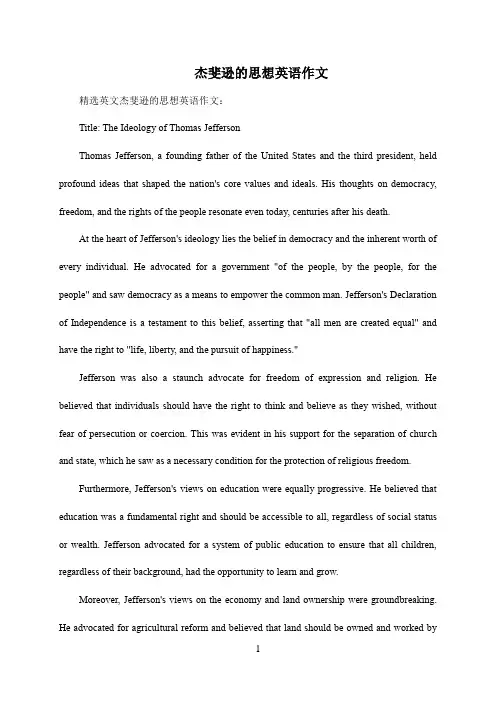
杰斐逊的思想英语作文精选英文杰斐逊的思想英语作文:Title: The Ideology of Thomas JeffersonThomas Jefferson, a founding father of the United States and the third president, held profound ideas that shaped the nation's core values and ideals. His thoughts on democracy, freedom, and the rights of the people resonate even today, centuries after his death.At the heart of Jefferson's ideology lies the belief in democracy and the inherent worth of every individual. He advocated for a government "of the people, by the people, for the people" and saw democracy as a means to empower the common man. Jefferson's Declaration of Independence is a testament to this belief, asserting that "all men are created equal" and have the right to "life, liberty, and the pursuit of happiness."Jefferson was also a staunch advocate for freedom of expression and religion. He believed that individuals should have the right to think and believe as they wished, without fear of persecution or coercion. This was evident in his support for the separation of church and state, which he saw as a necessary condition for the protection of religious freedom.Furthermore, Jefferson's views on education were equally progressive. He believed that education was a fundamental right and should be accessible to all, regardless of social status or wealth. Jefferson advocated for a system of public education to ensure that all children, regardless of their background, had the opportunity to learn and grow.Moreover, Jefferson's views on the economy and land ownership were groundbreaking. He advocated for agricultural reform and believed that land should be owned and worked bythose who lived on it. This idea of agrarian democracy aligned with his belief in the equality of all men and the importance of self-sufficiency.Lastly, Jefferson's thoughts on the role of government were shaped by his belief in limited government and the importance of individual liberty. He saw the government as a servant of the people, existing to protect their rights and liberties, rather than as a master over them. Jefferson's views on these issues were instrumental in shaping the Constitution and the Bill of Rights, documents that have become the cornerstone of American democracy.In conclusion, Thomas Jefferson's ideas and beliefs have had a profound impact on the United States and the world. His advocacy for democracy, freedom, education, and limited government continues to inspire and guide the nation today. Jefferson's ideology remains a powerful testament to the ideals that have shaped and continue to define the American people.中文对照翻译:题目:托马斯·杰斐逊的意识形态托马斯·杰斐逊是美国的开国元勋和第三任总统,他有着深刻的思想,塑造了美国的核心价值观和理想。
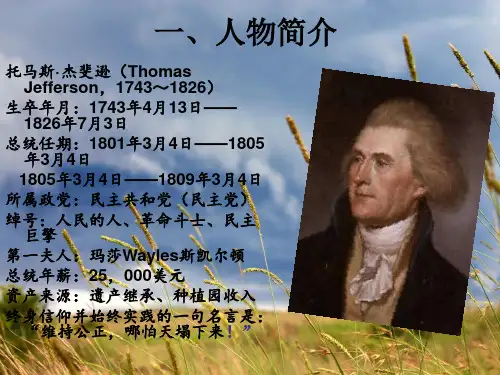
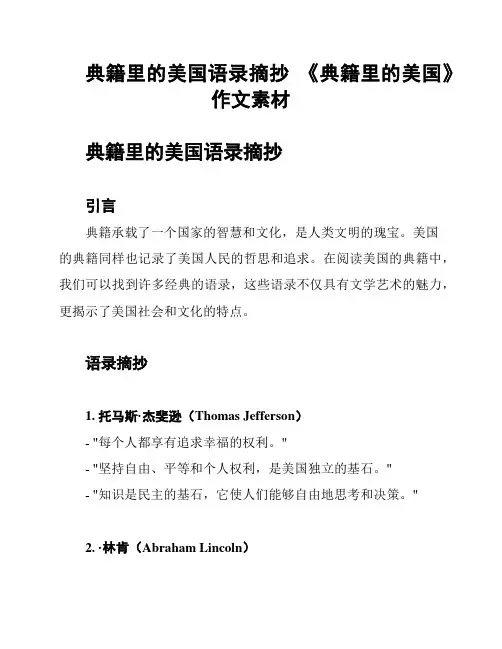
典籍里的美国语录摘抄《典籍里的美国》作文素材典籍里的美国语录摘抄引言典籍承载了一个国家的智慧和文化,是人类文明的瑰宝。
美国的典籍同样也记录了美国人民的哲思和追求。
在阅读美国的典籍中,我们可以找到许多经典的语录,这些语录不仅具有文学艺术的魅力,更揭示了美国社会和文化的特点。
语录摘抄1. 托马斯·杰斐逊(Thomas Jefferson)- "每个人都享有追求幸福的权利。
"- "坚持自由、平等和个人权利,是美国独立的基石。
"- "知识是民主的基石,它使人们能够自由地思考和决策。
"2. ·林肯(Abraham Lincoln)- "美国之所以伟大,不仅因为它是一个强大的国家,更因为它是一个追求自由和正义的国家。
"- "民主政府是人民、为人民和由人民执政的政府。
"- "给予别人自由,就是给了自己最好的礼物。
"3. 马丁·路德·金(Martin Luther King Jr.)- "我有一个梦想,梦想着有一天人们不再因肤色、种族和宗教受到歧视。
"- "正义无论迟早都会实现,因为神在其中。
"- "唯有爱能驱散仇恨,唯有光明能消除黑暗。
"4. 奥斯卡·怀尔德(Oscar Wilde)- "美国是唯一一个出生的时候不知道它是什么的国家。
"5. 爱默生(Ralph Waldo Emerson)- "没有谁能回到过去重新开始,但每个人都可以从现在开始,创造一个全新的结局。
"- "真正的旅行者,就是从不到达的人。
"- "成功不是取决于别人眼中的成就,而是取决于自己内心的满足。
"结语这些美国典籍中的语录,承载了美国国家精神、文化和人民的智慧。
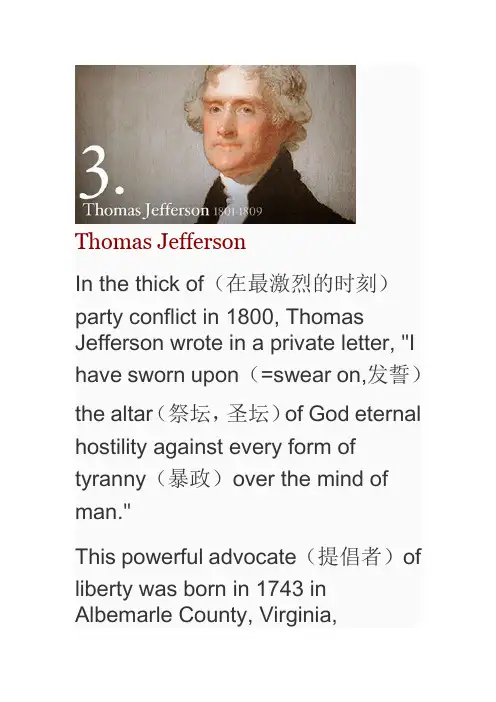
Thomas JeffersonIn the thick of(在最激烈的时刻)party conflict in 1800, Thomas Jefferson wrote in a private letter, "I have sworn upon(=swear on,发誓)the altar(祭坛,圣坛)of God eternal hostility against every form of tyranny(暴政)over the mind of man."This powerful advocate(提倡者)of liberty was born in 1743 in Albemarle County, Virginia,inheriting from his father, a planter and surveyor, some 5,000 acres of land, and from his mother, a Randolph, high social standing. He studied at the College of William and Mary, then read law. In 1772 he married Martha Wayles Skelton, a widow, and took her to live in his partly constructed mountaintop home, Monticello.(蒙蒂赛洛,美国地名)Freckled(有雀斑的)andsandy-haired, rather tall and awkward, Jefferson was eloquent (口才好的)as a correspondent,(通讯记者)but he was no public speaker. In the Virginia House of Burgesses and the Continental Congress, he contributed his penrather than his voice to the patriot cause. As the "silent member" of the Congress, Jefferson, at 33, drafted the Declaration of Independence. In years following he labored to make its words a reality in Virginia. Most notably(尤其),he wrote a bill(法案)establishing religious freedom,enacted(制定,颁布)in 1786. Jefferson succeeded(继承)Benjamin Franklin as minister to France in 1785. His sympathy for the French Revolution led him into conflict with Alexander Hamilton when Jefferson was Secretary of State in President Washington's Cabinet.(内阁)He resigned in 1793.Sharp political conflict developed, and two separate parties, the Federalists and theDemocratic-Republicans, began to form. Jefferson gradually assumed leadership of the Republicans, who sympathized with the revolutionary cause in France. Attacking Federalist policies, he opposed a strong centralized Government and championed(支持)the rights of states.As a reluctant(勉强的,不情愿的)candidate for President in 1796, Jefferson came within three votes of election. Through a flaw(瑕疵,缺陷)in the Constitution, he became Vice President, although an opponent(对手,反对者)ofPresident Adams. In 1800 the defect(缺陷)caused a more seriousproblem. Republican electors(选民)attempting to name both a President and a Vice President from their own party, cast a tie(不分胜负,打成平局)vote between Jefferson and Aaron Burr. The House of Representatives (美国众议院)settled the tie. Hamilton, disliking both Jefferson and Burr, nevertheless urged Jefferson's election.When Jefferson assumed the Presidency, the crisis in France had passed. He slashed(削减)Armyand Navy expenditures(开支), cutthe budget(预算), eliminated the tax on whiskey so unpopular in the West, yet reduced the national debt by a third. He also sent a naval squadron(中队,舰队)to fight theBarbary pirates(巴巴里海盗), whowere harassing(反复袭击)American commerce in the Mediterranean. Further, although the Constitution made noprovision(供给品) for the acquisition of new land, Jefferson suppressed(克制,抑制) his qualms (良心之谴责,不安)over constitutionality(符合宪法)when he had the opportunity to acquire the Louisiana Territory from Napoleon in 1803.During Jefferson's second term, he was increasingly preoccupied with (沉浸在)keeping the Nation from involvement in the Napoleonic wars, though both England and France interfered with(干涉,妨碍)the neutral rights of American merchantmen(商船,商人). Jefferson's attempted solution, an embargo upon(实行禁运)American shipping, worked badly and was unpopular.Jefferson retired to Monticello to ponder(考虑)such projects as his grand designs(宏大计划,宏伟设计)for the University of Virginia. A French nobleman observed that he had placed his house and his mind"on an elevated(高尚的)situation, from which he might contemplate the universe."He died on July 4, 1826.。
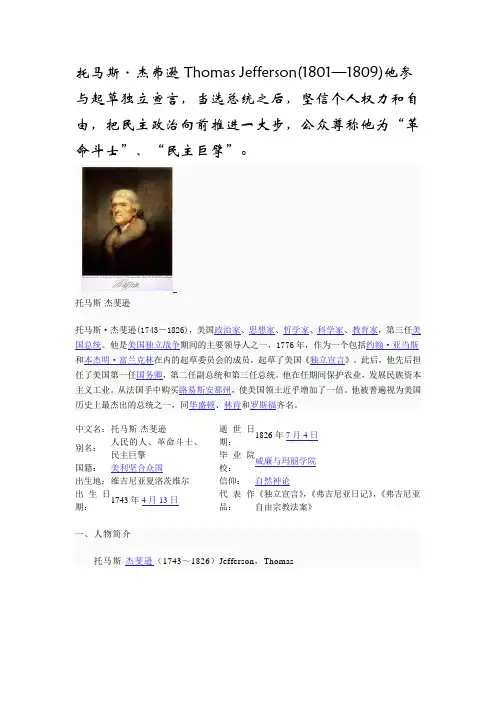
中文名: 托马斯·杰斐逊别名:人民的人、革命斗士、民主巨擎国籍: 美利坚合众国 出生地: 维吉尼亚夏洛茨维尔出生日期:1743年4月13日逝世日期: 1826年7月4日 毕业院校: 威廉与玛丽学院 信仰: 自然神论 代表作品: 《独立宣言》,《弗吉尼亚日记》,《弗吉尼亚自由宗教法案》一、人物简介托马斯·杰斐逊(1743~1826)Jefferson ,Thomas总统(1801~1809)。
1743年4的东西了。
这样一个小箱子,两百年前就相当于今日功能齐全的手提电脑。
思考与启迪这些小玩艺儿,现在我们看来都很简单,不值一提。
它们的意义在于,它们说明了美国立国先贤们对创新之重要性的认识。
杰弗逊和华盛顿总统,是对创新发明非常重视的第一代开国者。
在美国革命的动荡岁月里,两个人都没忘记抽空向英国和欧洲大陆订购花种、菜子,写信给家里关照不要错过了播种新品种的季节。
两个人对于新品种都有异乎寻常的热情,退休以后回到家,都一头扎到田间草地,侍弄新鲜花草。
杰斐逊还改良了一种犁铧,得到过国际组织嘉奖。
当华盛顿担任美国第一任总统的时候,他请杰斐逊担任国务卿。
那个时候,世界上最强大的是英国,制造业中心在英国和欧洲大陆,美国只是偏远落后的农林产品输出地,向欧洲出口棉花,木材,烟草,大米,羊毛,几乎所有工业制品都从欧洲进口。
第一代美国领袖知道,虽然美国有资源,但是如果它不制造,它就永远不是一个强国。
谁制造谁强大,是工业革命时代的铁律。
为此,美国必须广罗技术人才,有人才才会有自己的制造业。
从此开创了美国特别优待技术人才的传统。
至今为止,美国人有一个不成文的共识:美国必须是全世界给人才以最好条件的地方。
什么地方给人才的条件比美国好,美国肯定会提出更好的条件,超过那个地方。
1790年,华盛顿就任总统的第二年,他就让杰斐逊尽快确立专利保护制度。
就在华盛顿总统任内,杰斐逊一手操办,美国通过了保护创新和发明的专利法,从此美国成为世界上保护创新最严格的地方。
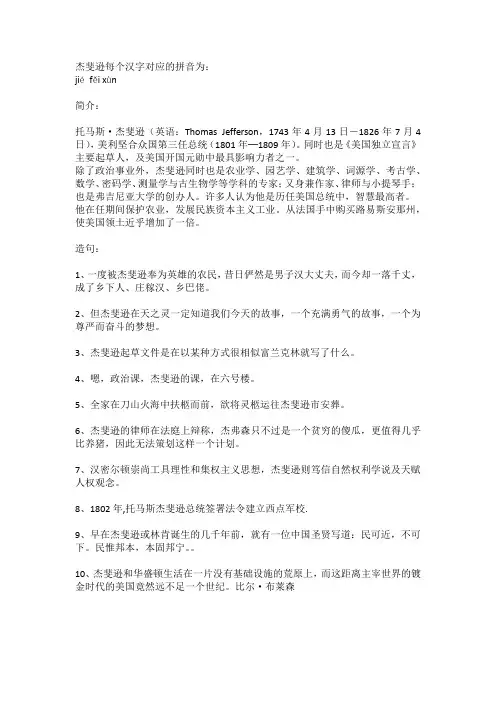
杰斐逊每个汉字对应的拼音为:jiéfěi xùn简介:托马斯·杰斐逊(英语:Thomas Jefferson,1743年4月13日-1826年7月4日),美利坚合众国第三任总统(1801年─1809年)。
同时也是《美国独立宣言》主要起草人,及美国开国元勋中最具影响力者之一。
除了政治事业外,杰斐逊同时也是农业学、园艺学、建筑学、词源学、考古学、数学、密码学、测量学与古生物学等学科的专家;又身兼作家、律师与小提琴手;也是弗吉尼亚大学的创办人。
许多人认为他是历任美国总统中,智慧最高者。
他在任期间保护农业,发展民族资本主义工业。
从法国手中购买路易斯安那州,使美国领土近乎增加了一倍。
造句:1、一度被杰斐逊奉为英雄的农民,昔日俨然是男子汉大丈夫,而今却一落千丈,成了乡下人、庄稼汉、乡巴佬。
2、但杰斐逊在天之灵一定知道我们今天的故事,一个充满勇气的故事,一个为尊严而奋斗的梦想。
3、杰斐逊起草文件是在以某种方式很相似富兰克林就写了什么。
4、嗯,政治课,杰斐逊的课,在六号楼。
5、全家在刀山火海中扶柩而前,欲将灵柩运往杰斐逊市安葬。
6、杰斐逊的律师在法庭上辩称,杰弗森只不过是一个贫穷的傻瓜,更值得几乎比养猪,因此无法策划这样一个计划。
7、汉密尔顿崇尚工具理性和集权主义思想,杰斐逊则笃信自然权利学说及天赋人权观念。
8、1802年,托马斯杰斐逊总统签署法令建立西点军校.9、早在杰斐逊或林肯诞生的几千年前,就有一位中国圣贤写道:民可近,不可下。
民惟邦本,本固邦宁。
10、杰斐逊和华盛顿生活在一片没有基础设施的荒原上,而这距离主宰世界的镀金时代的美国竟然远不足一个世纪。
比尔·布莱森。
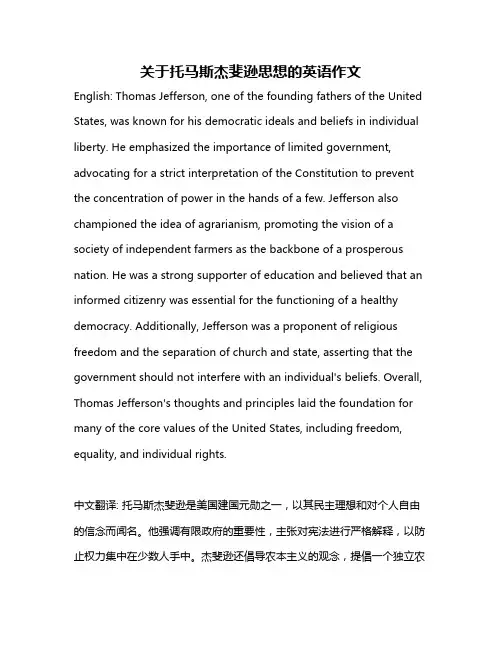
关于托马斯杰斐逊思想的英语作文English: Thomas Jefferson, one of the founding fathers of the United States, was known for his democratic ideals and beliefs in individual liberty. He emphasized the importance of limited government, advocating for a strict interpretation of the Constitution to prevent the concentration of power in the hands of a few. Jefferson also championed the idea of agrarianism, promoting the vision of a society of independent farmers as the backbone of a prosperous nation. He was a strong supporter of education and believed that an informed citizenry was essential for the functioning of a healthy democracy. Additionally, Jefferson was a proponent of religious freedom and the separation of church and state, asserting that the government should not interfere with an individual's beliefs. Overall, Thomas Jefferson's thoughts and principles laid the foundation for many of the core values of the United States, including freedom, equality, and individual rights.中文翻译: 托马斯杰斐逊是美国建国元勋之一,以其民主理想和对个人自由的信念而闻名。

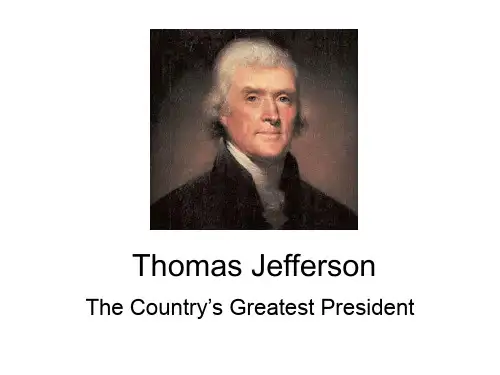
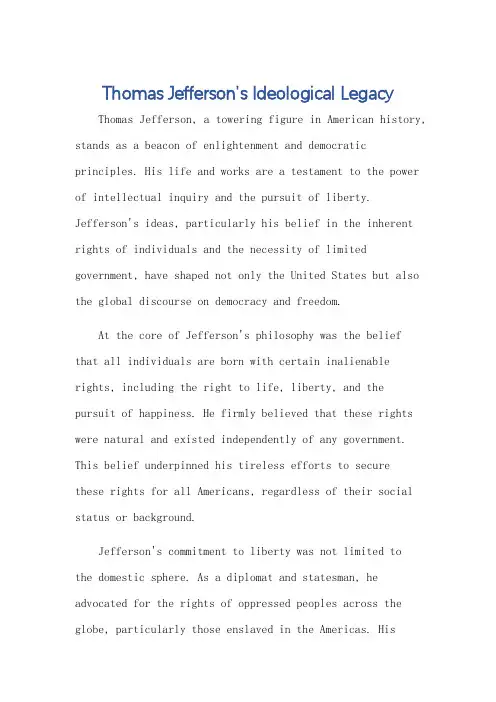
Thomas Jefferson's Ideological LegacyThomas Jefferson, a towering figure in American history, stands as a beacon of enlightenment and democratic principles. His life and works are a testament to the power of intellectual inquiry and the pursuit of liberty. Jefferson's ideas, particularly his belief in the inherent rights of individuals and the necessity of limited government, have shaped not only the United States but also the global discourse on democracy and freedom.At the core of Jefferson's philosophy was the beliefthat all individuals are born with certain inalienable rights, including the right to life, liberty, and thepursuit of happiness. He firmly believed that these rights were natural and existed independently of any government. This belief underpinned his tireless efforts to securethese rights for all Americans, regardless of their social status or background.Jefferson's commitment to liberty was not limited tothe domestic sphere. As a diplomat and statesman, he advocated for the rights of oppressed peoples across the globe, particularly those enslaved in the Americas. Hisdraft of the Declaration of Independence, which denounced the British monarchy as a tyrant and called for the establishment of a government based on the consent of the governed, was a powerful declaration of these principles.In addition to his commitment to individual rights, Jefferson was a strong proponent of limited government. He believed that government should serve the interests of the people and not vice versa. This belief led him to advocate for the separation of powers and checks and balances, which are fundamental principles of the American political system. Jefferson's distrust of concentrated power and his beliefin the importance of popular participation in governance continue to inform democratic theory and practice.Moreover, Jefferson's thoughts on education and the advancement of knowledge were equally profound. He believed that education was essential for the progress of societyand the cultivation of informed citizens. Jefferson founded the University of Virginia, which emphasized the importance of a liberal education and the pursuit of knowledge across disciplines. His vision of an educated populace capable ofgoverning themselves was a critical aspect of his democratic ideology.Jefferson's legacy is not without its complexities. His views on race and slavery, while evolving over time, were ultimately inconsistent with his broader principles of liberty and equality. However, it is important to remember that Jefferson's era was deeply influenced by the social and cultural norms of his time, and his thoughts and actions must be understood in this context.Nonetheless, Jefferson's contributions to American democracy and his ideas on liberty, limited government, and the importance of education remain relevant and influential today. His vision of a society where individuals are free to pursue their happiness and where government serves the interests of the people continues to inspire generations of Americans and people across the world.**托马斯·杰斐逊的思想遗产**托马斯·杰斐逊,美国历史上的一位巨人,是启蒙思想和民主原则的灯塔。
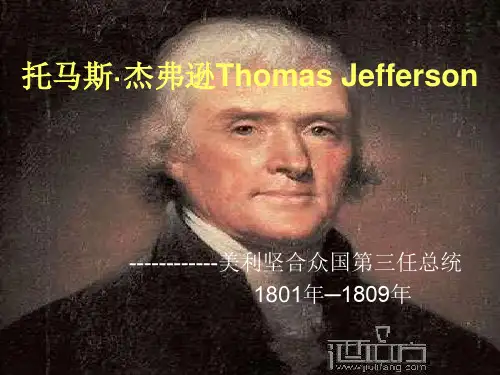
托马斯·杰斐逊的思想与遗产Thomas Jefferson, one of the Founding Fathers of the United States, left an indelible mark on the nation heloved and served. His legacy is not only in the Declaration of Independence and the Constitution, which he authored,but also in the principles and ideals he lived by.Jefferson's thoughts on democracy, individual rights, and the role of government are as relevant today as they werein his own era.Jefferson's belief in the sovereignty of the people was central to his political philosophy. He believed that the government existed to serve the people and that it shouldbe limited in its powers to prevent abuse and tyranny. This理念 was reflected in his drafting of the Declaration of Independence, which proclaimed the inalienable rights ofall men and the duty of governments to protect those rights. Jefferson also advocated for a strict interpretation of the Constitution, arguing that it should be a document that enumerated the powers of the federal government and leftthe rest to the states and the people.Jefferson was a staunch advocate of individual rights, particularly the right to property ownership. He believed that property ownership was essential to the pursuit of happiness and the foundation of a free society. Jefferson's own life was a testament to this belief, as he was a successful planter and architect who designed his own home, Monticello. His belief in the primacy of individual rights also extended to issues of slavery, which he saw as a moral wrong that needed to be addressed.Jefferson's thoughts on education were equally as profound. He believed that education was the key to personal growth and societal progress. Jefferson founded the University of Virginia, which was groundbreaking in its time for its emphasis on practical learning and the sciences. He also advocated for the establishment of a national system of public education, believing that it was essential to the democratic process and the development of a well-informed citizenry.Jefferson's thoughts on religion were also noteworthy. He was a Deist who believed in a Creator but rejected organized religion and its dogmas. Jefferson saw religionas a personal matter that should be kept separate from government and politics. His views on this topic were controversial in his time, but they have becomeincreasingly relevant in today's world, where issues of religious freedom and the separation of church and state are once again at the forefront of public debate.Thomas Jefferson's thoughts and contributions have had a profound impact on the United States and the world. His belief in the sovereignty of the people, the primacy of individual rights, the importance of education, and the separation of religion and government are as relevant today as they were in his own era. Jefferson's legacy is a testament to the power of ideas and the importance of upholding democratic principles and ideals.**托马斯·杰斐逊的思想与遗产**托马斯·杰斐逊,美国开国元勋之一,为他所热爱和服务的国家留下了不可磨灭的印记。
杰斐逊的法律思想托马斯·杰斐逊(英语:Thomas Jefferson,1743年4月13日-1826年7月4日),美利坚合众国第三任总统(1801年─1809年),同时也是《美国独立宣言》主要起草人,美国开国元勋之一,与乔治·华盛顿、本杰明·富兰克林并称为美利坚开国三杰。
除了政治事业外,杰斐逊同时也是农业学、园艺学、建筑学、词源学、考古学、数学、密码学、测量学与古生物学等学科的专家;又身兼作家、律师与小提琴手;也是弗吉尼亚大学的创办人。
许多人认为他是历任美国总统中智慧最高者。
他在任期间保护农业,发展民族资本主义工业。
从法国手中购买路易斯安那州,使美国领土近乎增加了一倍。
杰斐逊的法律思想主要体现在《独立宣言》及施政纲领中。
一、天赋人权观杰斐逊把天赋人权的思想写入了《独立宣言》中。
“我们认为这些真理是不言而喻的,人人生而平等,他们都从他们的‘造物主’那边被赋予了某些不可转让的权利,其中包括生命权、自由权和迫求幸福的权利。
为了保障这些权利,所以才在人们中间成立政府。
而政府的正当权力,则系得自被统治者的同意。
如果遇有任何一种形式的政府变成损害这些目的的,那么,人民就有权利来改变它或废除它,以建立新的政府。
这新的政府,必须是建立在这样的原则的基础上,并且是按照这样的方式来组织它的权力机关,就人民看来那是最能够促进他们的安全和幸福的。
”“然而,当一个政府恶贯满盈、倒行逆施、一贯地奉行着那一个目标,显然是企图把人民抑压在绝对专制主义的淫威之下时,人民就有这种权利,人民就有这种义务,来推翻那样的政府,而为他们未来的安全设立新的保障。
”二、人民主权论与天赋人权思想相适应,杰斐逊还继承和发展了卢梭的人民主权思想。
他认为,“政府的正当权利,则系得自被统治者的同意”。
如果政府滥用这些权力,则人民有权收回委托给政府的权力。
只是有时在人们还可以容忍的时候,不愿意废除他们所习惯了的那种政治形式以恢复他们的权利,但这并不表明人民没有这样的权利。
美国历届总统简介:第3任总统托马斯杰斐逊Thomas Jefferson was the third President of the United States. He was born in 1743in Virginia and died on July 4, 1826. He was the third of ten children and grew up on his father's 5,000-acre plantation. He studied law at college. Jefferson is frequently listed as one of the USA's greatest Presidents. He was also one of its most powerful advocates of personal freedom and envisioned a great "Empire of Liberty".托马斯·杰斐逊是美国第三任总统。
1743年,他出生在美国弗吉尼亚州,并于1826年7月4日逝世。
杰斐逊有十个兄弟姐妹,他排行第三,且从小成长在父亲经营的5000亩种植园中。
在大学里,他学的是法律。
人们常将杰斐逊列入美国最伟大总统的行列。
杰斐逊强烈支持人身自由,他还设想过一个伟大的“自由帝国”。
Jefferson became a lawyer in 1767 and had a great love of books. He was a very eloquent correspondent using the written word, but was no public speaker. At theage of 33, Jefferson drafted the Declaration of Independence. In the following years, he labored to make its words a reality in Virginia. Most notably, he wrote a bill establishing religious freedom, which became law in 1786.1767年,杰斐逊成了律师,并非常热爱书籍。
杰弗逊名词解释
"杰弗逊"通常指的是美国历史上的一位重要人物,即第三任美国总统托马斯·杰斐逊(Thomas Jefferson)。
以下是对托马斯·杰斐逊的名词解释:
托马斯·杰斐逊(Thomas Jefferson):
-生平简介:托马斯·杰斐逊(1743年4月13日-1826年7月4日)是美国独立战争时期的重要人物之一,他不仅是美国的国父之一,还是《独立宣言》的主要起草人之一。
-独立宣言:托马斯·杰斐逊是独立宣言的起草委员之一,他的文笔才华使他成为宣言的主要作者之一。
-路易斯安那购地:作为总统,他主持了路易斯安那购地交易,将法国在美洲的领土转让给了美国,为美国的西部扩张打下了基础。
-民主共和制:杰斐逊在其总统任期内,试图推动一种更为平等和民主的政治制度,提倡小农业主和个体自由。
-蒙蒂塞洛:他的家园蒙蒂塞洛(Monticello)是一座历史悠久的庄园,现在是一处博物馆。
托马斯·杰斐逊在美国历史上有着深远的影响,他的思想、政治理念以及对国家的贡献都被后人所铭记。
历任美国国务卿美国国务卿是美国国务院的首长,曾被称为“美国政府的总管”。
以下为部分历任美国国务卿:1.托马斯·杰斐逊(Thomas Jefferson):首任国务卿,美国独立战争期间与英国签订《巴黎和约》。
2.詹姆斯·麦迪逊(James Madison):美国第四任总统,提出“1812年战争”以及“权利法案”。
3.约翰·昆西·亚当斯(John Quincy Adams):外交政策强硬派,在任期间美国通过“门罗主义”和“路易斯安那购地案”扩大了西部领土。
4.亨利·克莱(Henry Clay):政治家,提出“克莱顿-布尔沃条约”和“克莱顿-布尔沃法案”。
5.威廉·亨利·西华德(William Henry Seward):外交政策制定者,在任期间美国通过《阿拉斯加购地案》和《普拉特修正案》。
6.约翰·斯达林·海伊(John Stanford Hayes):曾短暂担任总统,下令设立美国内政部和国家公园管理局。
7.查尔斯·约瑟夫·门罗(Charles Joseph Monroe):提出“门罗主义”。
8.威廉·梅森(William Mason):无显著贡献。
9.爱德华·利文斯顿(Edward Livingston):曾担任副国务卿和司法部长。
10.鲁弗斯·金(Rufus King):外交政策强硬派。
11.约翰·杜勒斯(John Dulles):外交政策强硬派,提出“杜勒斯主义”。
12.威廉·皮尔斯(William Pierce):无显著贡献。
13.乔治·舒尔茨(George Shultz):外交政策强硬派,曾任国防部长。
14.詹姆斯·贝克三世(James Baker III):曾担任白宫幕僚长和财政部长。
15.劳伦斯·伊格尔伯格(Lawrence Eagleburger):外交政策强硬派,曾任国家安全顾问。